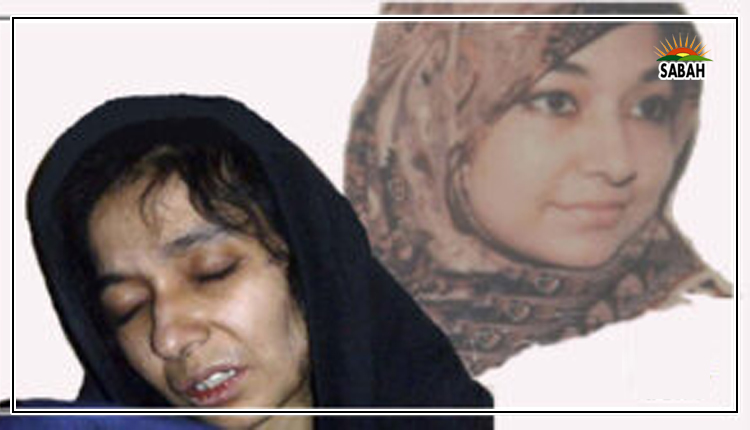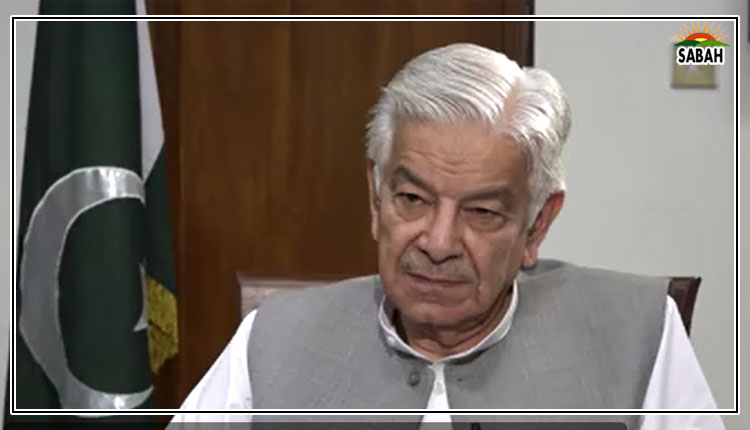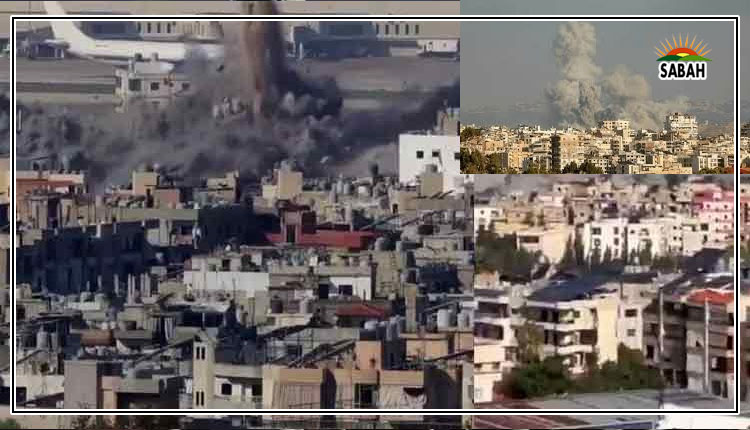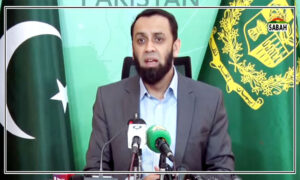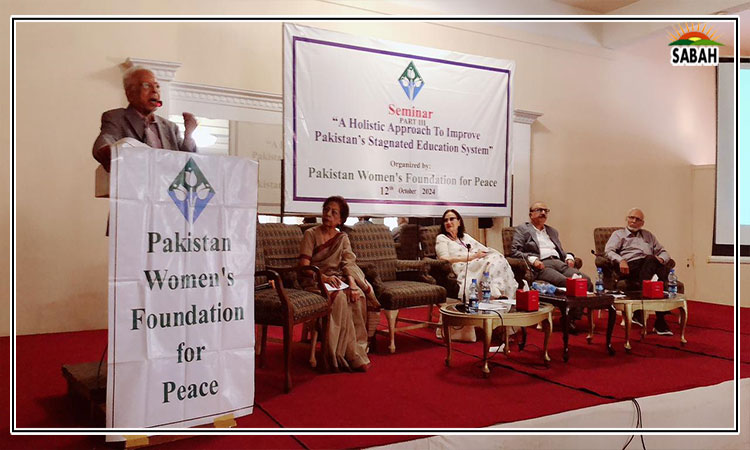PWFFP holds seminar on subject ‘A Holistic Approach to Improve Pakistan’s Stagnated Education System’
ISLAMABAD, Oct 13 (SABAH): Pakistan Women’s Foundation for Peace (PWFFP) has held 3 seminars on the subject “A Holistic Approach to Improve Pakistan’s Stagnated Education System”. Today we hold the 3rd and last of this series.
Our objective for holding these seminars was to seek consensus on the solutions forwarded by experts in the field of education to the problems that assail Pakistan’s education system since 1947, when literacy was a mere 13%, problems that continue, despite the several ambitious plans and expensive policies presented by different Govt in their tenures.
Today Pakistan’s education system suffers a very, demeaning rank in international education/literacy indices at approx. 60%, now the lowest in the region!! A consistent rank over a period of 15 years!!! This is acknowledged in the Education Emergency declared by the PM in May 2024, and the setting up of a Task Force which is mandated to make recommendations for educational projects, focusing on removing barriers, to achieving literacy targets, and ensuring the education of underprivileged children…Policy-making for government schools and decisions to enhance the quality and promotion of education.

The focus of Education Problems identified by the task force in August 2024 were infrastructure, access to schooling, inclusion, low learning outcomes, teacher shortage, governance, management & bureaucratic turnover. Score cards for the different districts were introduced. The District Education Performance Index DEPIx structured across these domains.to cover 134 districts across Pakistan, Baluchistan, Khyber Pakhtunkhwa (KP), Punjab, Sindh and the Islamabad Capital Territory (ICT).
The top 10 districts in education were ICT, seven from Punjab and two from KP. No districts from Sindh or Baluchistan!!! The disparities across province and within provinces was startling. Only Islamabad fell into the “High” category, whilst more than half of Pakistan’s districts (76) fell into the “Low” performance category!! These were the yields after 77years of the August 1947 Education conference when the Quaid emphasized how crucial it was for the prosperous future of Pakistan to have a quality education system.
There were previous declarations of emergency. In the 2010 education emergency a task force was also created and 2011 was declared the Education Year. It was then revealed that “one of every 10 children not in school, in the world, lives in Pakistan. The country was far from meeting the Millennium Development Goal (MDG) of providing universal education by 2015. Only 23 percent of Pakistan’s children under the age of 16 attended secondary school and almost one-third of Pakistanis lived in extreme educational poverty—having received less than two years of education. Only 50 percent of school children (aged 6-16 years) in Pakistan could read or write. Appointing low qualified teachers at the primary level was among the main reasons for falling standards of education that rendered this age group illiterate”!!!
After 13 years Prime Minister Muhammad Shehbaz Sharif has again announced an “Education Emergency” across Pakistan to enroll approximately 26 million children who are currently out of school, aiming to transform Pakistan into “one of the most educated countries in the world.”
“The numbers of the 2.6 billion in Pakistan is larger than the population of a 150 countries” There is a total of 313,418 both public and private schools (including 2,088 other public category) across all levels in the school education system in Pakistan. Majority of this combined total, 176,184 (56.2%), belong to the public sector, while the private sector makes up for 137,234 (43.8%) schools. 2. 2 million teachers…Despite this, The “Unicef Representative in Pakistan Abdullah A Fadil has stated over 70 percent of children of age 10 in Pakistan could not read or understand text”!!!
Pakistan Women Foundation for Peace has held two seminars to understand why education languishes in a state of endemic crises despite so many plans and expensive policy initiatives starting from the year 1947 to the year 2024, along with a number of declared education emergencies…What is absent that outcomes remain so abysmal!!!?
Thus in our 1st seminar we invited eminent educationists and institution’s heads who have successfully worked to improve quality teaching in schools, and teacher training institutes (as teacher are the most important agents of good learning) Kazim Saeed; Chairman Board of Trustees Idara-e-Taleem-oAagahi(ITA), Professor Stephen M. Lyon; Dean of the Faculty of Arts and Sciences The Agha Khan University, Shahnaz Wazir Ali; President of SZABIST University, Dr. Farid F Panjwani; Professor & Dean Institute for Educational. Development, AKU Pakistan, Salma Ahmed Alam; CEO, Durbeen, and board of governors Zindagi Trust, Shazia Kamal; Executive Vice president Education The Citizens Foundation (TCF.), Abdul Kabir Kazi; Managing Director Sindh Education Foundation, who forwarded their views as to what waswhat needed to improve the existing poorly functioning education system,..
In part two of our seminar series, we invited Economist Dr. Kaiser Bengali (Economist), Sadiqa Salahuddin (Executive Director Indus Resource Centre), Baela Raza Jamil, (CEO of Idara-e-Taleem-o-Aagahi (ITA) & Founder Pakistan Learning Festival), Dr. Faisal Bari (Associate Professor of Economics School of Humanities and Social Sciences, CEO/Senior Research Fellow Institute of Development and Economic Alternatives IDEAS) & Nawab Zafar Ali (Head of Advocacy & Communication Department, Sindh Education Foundation, Govt of Sindh) to offer their solutions to remove the bottlenecks to promote a model inclusive education system for Pakistan.
The problems identified by the panelists participating in both the seminars emphasized, that it was vital to improve the public sector education system…expand its services and enhance its quality, through responsible well trained certified teacher and diligent managers. Curriculum revision and modern technology aids, skills training, sports, extracurricular activities that promote critical thinking should be stressed.
The assessment systems and various boards of education and their examination systems should be over hauled to ensure merit quality of the students that entered higher educational institutions. The rise in poverty, and its impact on the health of the children of the underprivileged as 40% of the children suffer from physical and mental stunting along with the damaging impact of climate change challenges, of floods and rising temperatures, especially in rural communities, were to be kept in mind when designing new policies.
Gender disparity would improve, if school distance, transport services infrastructure, security, were to be provided for the girl child who was subject to archaic social norms and patriarchic. The remarkable consensus was on the crucial need to control the population explosion, and allocate funds commensurate to the need of this population from 1.7% of the national GDP to 4% as recommended by UNESCO especially for the imperative accommodation of 2.6million out of school children into school. The missing Political Will had to be activated, and the biggest barrier to improving the education system of Pakistan the immanent presence of Entrenched Corruption was to be eliminated.
For part III of our seminar series along with the improvement schooling system we are also including the needed reforms in the higher education system and have invited an excellent panel of experts in the domain of education Dr. Shahid Siddiqui (Former Vice Chancellor Allama Iqbal Open University), Dr. Ishrat Husain (Former Governor, State Bank of Pakistan), Dr. Sarosh Hashmat Lodi (Vice-Chancellor NED University of Engineering & Technology), Dr. Anjum Halai (Dean Faculty of Arts and Sciences at Aga Khan University).
When we come to graduate level education we have to keep in mind, the criteria of admission policy into higher education institutions, nature of curriculum, quality of faculty, and outcomes. Though there are approx. 202 universities in both the public and private sectors accredited by the HEC in Pakistan, there is a significant lack of access to higher education, especially in rural areas, such as a lack of infrastructure, and lack of qualified faculty. Gender inequality also exists in higher education in Pakistan, due to social norms and lack of financial resources.
The Higher Education Commission’s FY23 annual report stated that there about 470,000 graduates, including bachelors, masters, PhDs and others. Are there enough jobs in the economy to absorb half a million graduates? Pakistan is ranked 63rd out of 163 countries on World Bank’s University-industry linkage index. HEC annual reports show that the bulk of graduates are in arts and humanities. Will enable our youth to find suitable employment in a Hi tech World. These are some of the questions needed to be answered today.
We urge for a multi-sectoral approach to improving education holistically. What is required is collaboration among all the stakeholder groups, the government, policy makers, political party leadership, educationists, economists, teachers, parents, responsible civil society groups, councilors, Health and environment practitioners, to jointly formulate a strategy to remove the hurdles and the bottlenecks that impede a good education system in Pakistan…To work out a realistic sustainable policy and ensure implementation…Encourage Public private partnership as they have borne excellent results visible in the Karachi adopted schools.
Most important to what can ensure successful outcomes in improving Pakistan’s education system is the spirit of Collective Ownership… “The Quaid stated at “The All Pakistan Education Conference” held in Karachi on 27th November 1947 that. “Education does not merely mean academic education. What we have to do is to mobilize our people and build up the character of our future generations”
Education must be made a national priority no less important than national defence. “Education was a matter of life and death to our nation. The world is moving so fast that if we do not educate ourselves we will not only be left behind, but also be No More” (Quaid e Azam)
We strongly feel that Pakistan’s Stagnant System can be vitalized and yield high outcomes provided the will to make it The National Priority is activated in the “Chambers of the Power holders” in Pakistan and in the collective ownership of its citizens.



